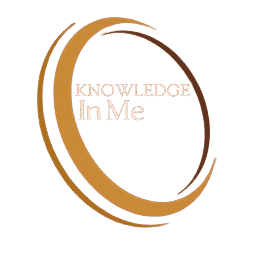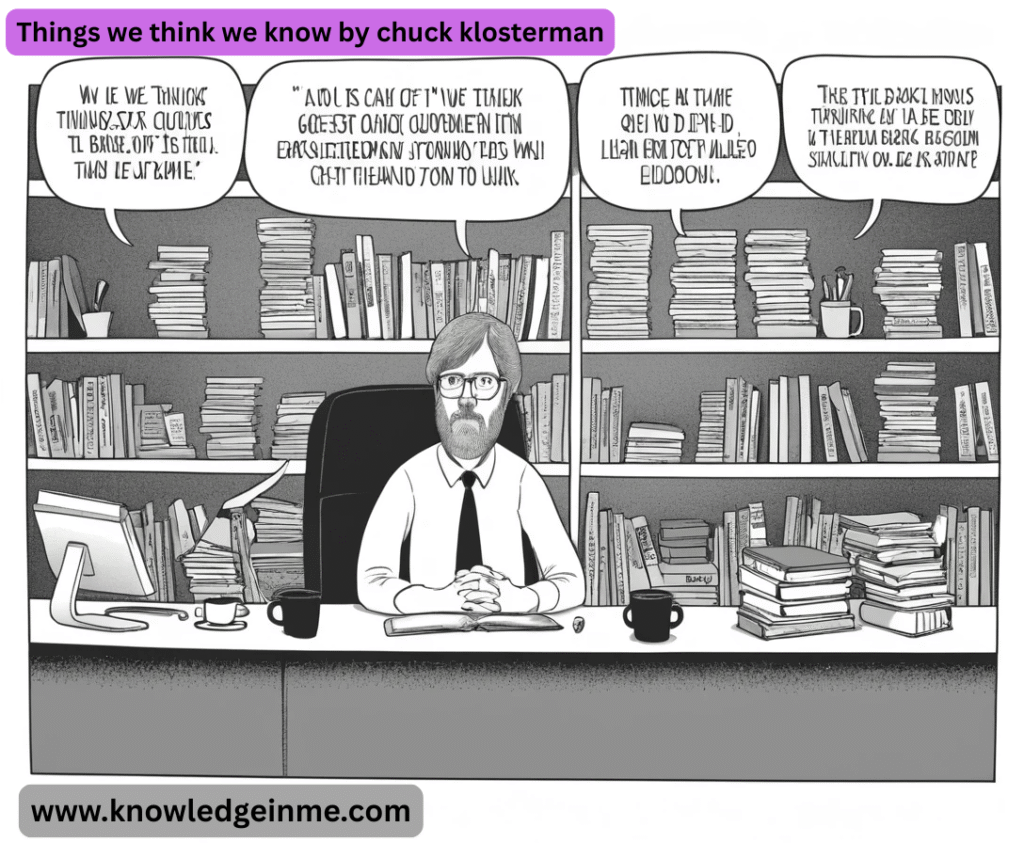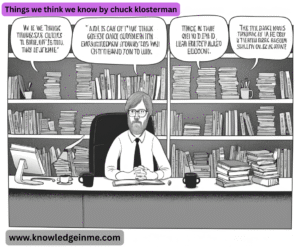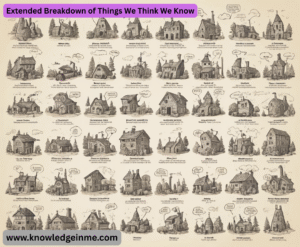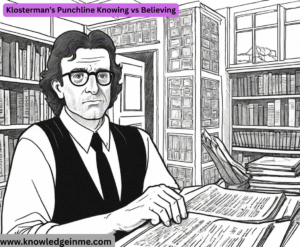Things we think we know by chuck klosterman Things We Think We Know is an essay by Chuck Klosterman, originally published in his 2009 collection Eating the Dinosaur. The piece explores the nature of knowledge, perception, and the assumptions we make about the world. Klosterman examines how people confidently believe things that may not be entirely true—or may only be true in specific contexts.
Key Themes & Ideas:
- The Illusion of Certainty – Klosterman argues that people often accept ideas as absolute truths, even when those ideas are based on incomplete or flawed reasoning.
- Media and Reality – He discusses how media narratives shape our understanding of events, often simplifying complex realities into digestible (but misleading) stories.
- Memory and Subjectivity – The essay questions how much of what we “know” is actually just a constructed memory or a story we tell ourselves.
- Cultural Myths – Klosterman points out that many widely accepted beliefs (about history, science, or society) are often just repetitions of what we’ve heard, not things we’ve verified ourselves.
- The Unknowable Past –
- He suggests that historical events are often interpreted
- in ways that fit modern perspectives,
- making it hard to know what really happened.
Notable Quotes & Insights:
- “We don’t actually know most of what we think we know.”
- “The past was just as confused as the present; we just pretend it wasn’t.”
- “The more we learn, the more we realize how little we truly understand.”
Why It Matters:
- Klosterman’s essay is a reminder of
- how much of human knowledge is built on assumptions,
- narratives, and collective beliefs rather than absolute truths. It encourages skepticism and self-awareness about the limits of what we can really “know.”
Extended Breakdown of Things We Think We Know
Klosterman’s Approach: The “Anti-Wisdom” Essay
- Things we think we know by chuck klosterman Klosterman doesn’t just debunk myths; he questions why we believe them in the first place. His tone is conversational but laced with skepticism, mixing highbrow references (e.g., Heidegger, Baudrillard) with lowbrow examples (e.g., Saved by the Bell, NFL stats). This creates a disorienting effect: Wait, do I actually know this, or did I just absorb it from TV?
The Essay’s Core Argument: “Knowledge as Echo Chamber”
- Klosterman suggests that most “knowledge” is recursive:
- We hear something repeated (e.g., “The Berlin Wall fell because of Reagan’s speech”).
- It fits a narrative we like (e.g., “America wins the Cold War”).
- We never interrogate it (e.g., Did the Wall really fall because of Reagan? Or was it economics? Or Gorbachev?).
- He’s less interested in correcting facts than in exposing how comfortable we are with unverified truths.
Key Examples & Pop Culture Tie-Ins
- Klosterman uses relatable examples to show how shaky our “knowledge” is:
- Sports Stats:
- Fans “know” a player is great because of numbers
- —but stats are cherry-picked to fit narratives.
- Music Criticism: People claim to “know” an artist’s influence (e.g., “Nirvana killed hair metal”) without considering timing, industry shifts, or luck.
- Historical Events: The “official story” of things like Watergate or the moon landing is often a simplified version that ignores chaos, accidents, or sheer randomness.
The Role of Media (A Klosterman Obsession)
- Klosterman often critiques how media creates reality. In this essay, he argues:
- News isn’t about truth; it’s about stories that feel true.
- Interviews (a recurring theme in Eating the Dinosaur) are performances—people, including journalists, construct answers they think the audience wants.
- Even “fact-checking” can’t escape bias,
- because facts are selected to fit frameworks.
Connection to Klosterman’s Other Work
- Sex, Drugs, and Cocoa Puffs: Similar themes about how pop culture shapes identity.
- But What If We’re Wrong?: Expands on the idea that future generations will see our “truths” as laughably wrong.
- The Nineties:
- Examines how our memory of eras is distorted by media and nostalgia.
Why This Essay Resonates Today
- In the age of social media, Klosterman’s argument feels prophetic:
- Viral Misinformation:
- We “know” things because they’re repeated, not because they’re verified.
- Algorithmic Bubbles: Our “knowledge” is curated by feeds that reinforce what we already believe.
- Retcon History:
- Past events are constantly reinterpreted to fit modern values
- (e.g., rewriting the legacies of celebrities, politicians).
Klosterman’s Punchline Knowing vs Believing
- The essay’s power comes from its refusal to offer easy answers. Instead, Klosterman leaves you with:
- “We don’t just misunderstand the world—we misunderstand how we misunderstand it.”
- It’s a call to embrace uncertainty,
- to question the stories we’re told, and to recognize
- that much of what we “know” is really just
- what we’ve agreed to believe.
The Essay’s Hidden Structure: A Reverse Detective Story
- Things we think we know by chuck klosterman Klosterman doesn’t present an argument—he dissolves one. The essay unfolds like this:
- False Start: He opens with a seemingly straightforward claim (e.g., “We all know why the Berlin Wall fell”).
- Peeling Layers:
- Then, he reveals how that “knowledge” is built on shaky foundations
- (media narratives, cultural bias, half-remembered facts).
- No Resolution: Instead of a tidy conclusion, he leaves you with a question: “What else do I ‘know’ that’s actually just a story?”
- This mirrors how conspiracy theories work—except Klosterman applies it to mainstream beliefs.
The David Koresh Thought Experiment (Hidden Gem)
- In one of the essay’s sharpest moments, Klosterman references the Branch Davidians (Waco siege) to ask:
- What if David Koresh truly believed his own prophecies?
- What if we’re all just as self-deluded, but about less extreme things?
- This isn’t just about cults—it’s about any ideology (politics, fandoms, brand loyalty) where people cling to beliefs despite contradictory evidence.
Klosterman’s Secret Weapon: The “Unanswerable Question”
- He loves posing questions that sound simple but explode on contact:
- (Hint: It wasn’t—we just edit out the chaos.)
- “If no one remembers something happening, did it happen?”
(See: “The ’90s were a time of peace”—ignoring Bosnia, Rwanda, etc.) - These aren’t rhetorical—they’re traps meant to expose how all history is a “choose your own adventure” story.
Why This Essay Feels Like a 2020s Zeitgeist Primer
- Klosterman wrote this pre-social media dominance, but it predicts:
- The “Post-Truth” Era:
- We now know facts are filtered, yet can’t stop consuming them.
- Nostalgia Hacking: TikTok edits rewrite the past daily (e.g., “The 2000s were all about ____”).
- AI-Generated Reality: If we couldn’t trust human narratives, how do we handle algorithmic ones?
How to Steal Klosterman’s Techniqu
Want to write like him? Notice how he:
- Starts with a Pop Culture Hook (e.g., “Think about how we talk about O.J. Simpson now…”)
- Swerves into Philosophy (e.g., “But what does ‘guilty’ even mean in collective memory?”)
- Drops a Mind-Bomb (e.g., “Maybe the trial wasn’t about murder—it was about how TV defines justice.”)
